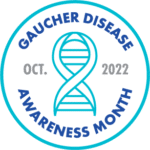As part of Gaucher Disease Awareness Month, we’re sharing stories from Gaucher patients, family, and caregivers about their experiences and their journeys.
Want to share your story? Contact us and we’ll be in touch.
The following, as conveyed by an anonymous Gaucher patient we will refer to as ‘Arthur’, is slightly edited for formatting and style.
Tell us about your beginnings with Gaucher disease. How did you learn about it?
I was diagnosed when I was about 5. At that time, very little was known about the disease in Ukraine, where I am from.
Once, playing outdoors, I suffered a bad fall and complained of abdominal pain; my uncle, who was a gastric surgeon, examined me and noticed enlarged spleen. Having ruled out a few other possibilities, he suspected Gaucher; this was subsequently confirmed.
My symptoms were mostly limited to fatigue, frequent nose bleeds and extensive bruising (due to very low platelet count), enlarged liver and very enlarged spleen (as a result, my ribs actually ended up developing slightly differently on my left side). And I was sick a lot with various “regular” diseases, due to being weakened and having a compromised immune system.
I was mostly advised to avoid falls in order to limit the risk of bone fractures or internal injuries. I was also on a strict diet, which excluded all animal fats – this meant no pork or other fatty meats, no milk, butter, or any sweets or products containing more than just trace amounts of milk fat.
No effective treatment was available, so I was definitely on track to splenectomy and the overall prognosis was not good. The doctors were very qualified and well-meaning, but their hands were tied and their options extremely limited, so they did the best they could with what they had.
For lack of any other options, Gaucher was treated like cancer; the regimen included hormones to boost appetite (I could eat more lean beef at one sitting than my Dad!) and chemotherapy, both intravenous and oral. The steroids made me VERY cranky; the IVs made me tired, and the pills almost invariably caused nausea and vomiting.
We tried to keep my spirits up with all kinds of jokes around this “reliable and consistent” response. Thankfully, my parents were determined to get me treated in the US or in Israel and were willing to move, so in the meantime they tried to limit the frequency, duration and scope of such chemotherapy courses, which were doing damage and were mostly suggested as just a little better than doing nothing.
Needless to say, the stress took a severe toll on my entire family; it was “all hands on deck” all the time. The diverse and high-vitamin specialized diet that I had to be on was very challenging in the context of scarcity and high prices on everything other than the most basic food staples. Generally, fresh fruit and vegetables were only available seasonally. What long-term effect the chemotherapy and the Chernobyl catastrophe might have had on me remains to be seen.
How did you get connected with the National Gaucher Foundation? How has NGF helped you in managing your Gaucher disease and everything that comes with it?
Upon moving to the United States, I was one of about 12 people who were among the first to receive the original enzyme replacement therapy.
In other words, I was one of the luckiest people on Earth in both situation and outcome. For me, it was 100% effective, with zero side effects.
Gradually, all my parameters returned to near-normal, with a few minor exceptions of those that never will be but don’t bother me at all. After almost 30 years and a few various iterations of the treatment, I will never be able to adequately express how grateful I am to NGF for everything they did and continue to do for us, or to ever thank my family and the doctors and treatment teams enough for the second chance that I was given.
For more years than I can count, NGF paid my very high insurance premiums, all through the difficult times when I was a struggling student and a no less struggling professional! NGF keeps us informed, engaged, and always remembering that there is no such thing as a permanently fixed spotlight: we move, and the spotlight has to move with us.
To keep our needs, issues and struggles at the forefront and in focus, both now and in the future, we have to be uncompromisingly proactive. The energy of NGF is truly inspiring; they are good people in the truest sense of the word – caring and able to adapt to any shifting environment for the benefit of the patients.
What message do you want to share with patients and families that are just beginning their Gaucher journey? Are there any lessons you’ve learned that you think they should know?
There are so many lessons.
Today, the outlook seems a lot less bleak, with a number of effective treatments available. You will need a rock-solid team of experts and genuinely caring people who can help you fight for consistent, high-level medical care, surveillance, and insurance coverage, especially if you are lucky like me: feeling well enough to work full-time and always extremely busy.
Your care and treatment “dream team”– doctors, nurses, medical assistants, pharmacists, and case managers – understands that living with a serious disease is a thankless job and it pays nothing. In fact, on the contrary – it’s expensive to have. The treatment has to be constant, and the costs are unbelievable.
Any one of us can be just one messed up claim away from being totally broke, so please be 100% informed about your own insurance, take charge and be as knowledgeable and involved as any professional. You must have insurance with no lifetime maximum, otherwise this will be yet another major headache on top of all the other ones. Unfortunately, serious complaints often get less attention than minor problems, and mistakes are extremely costly, so please be thankful and kind to customer service but at the same time constantly vigilant, following up on EVERYTHING.
Be persistent and completely unyielding on “mission critical” points and details.
If you are as fortunate as I am, you can trust your doctors unconditionally. Please do as they say and watch your health. This includes regular tests and checkups.
Beyond the highly-specialized treatment that Gaucher requires, it’s really not complicated: stay hydrated, eat/diet well, sleep enough, exercise regularly, be active and have a healthy social life and support system. You are in trouble if even one of these five is lacking even a little. Please be consistent. Good luck! It’s OK to have fun and be a survivor.
Is there anything that you think the general public should know about Gaucher disease and the greater Gaucher community?
Gaucher is considered a relatively rare disease. We will all be forever indebted to those who decided to ignore the “rare” designation and instead to focus aggressively on developing effective treatments at any cost for those who had nowhere else to turn.
I hope that the general public can appreciate the simple fact that statistics don’t matter to a kid with a deadly disease, whose family is completely freaking out. No serious disease feels “rare” to those who suffer from it – this reality touches all people of all ages equally.
It is therefore important to invest in research and treatment of any and all diseases; this can both save lives and improve lifestyles. Taking care of the sick enriches our lives and makes any society better. I hope that for us humans, no cost will be considered too high to be humane. Thank you so much for the opportunity to say this.
If you could describe the Gaucher community in a few words or phrases, what would you say?
Very kind, supportive, generous, accepting and proactive people!


